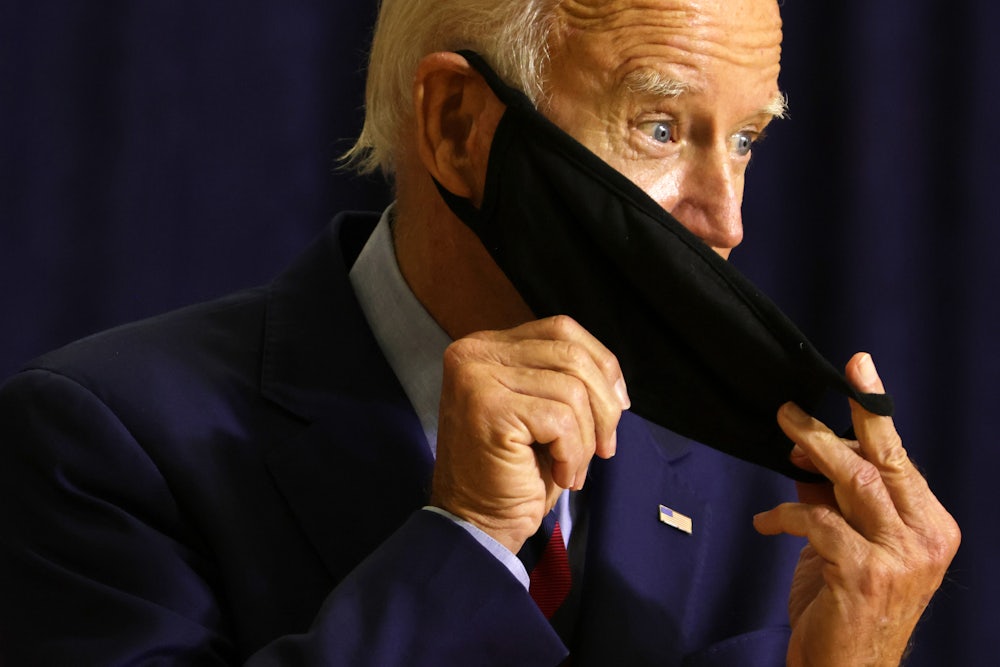Campaign leaks about Joe Biden’s intentions as president so far seem to follow two completely incompatible paths. On one track, Biden has been reinvigorated by the scale of the coronavirus pandemic and is gearing up for an “FDR-size” presidency to not just patch up the cracks that have appeared since March but attempt broad, systemic changes to fix the underlying problems that were exposed. On the other, Biden is wedded to bipartisanship, keeping the filibuster, reassuring big donors, and not blowing up the deficit—a set of criteria that would define a failed presidency, in other words. Though it doesn’t impact the calculus of whether Biden would be a better president than Donald Trump, it is nonetheless very frustrating for people who would prefer to have some idea whether the future is going to be tolerable or not.
A story from The Washington Post this week further hinted at this Schrödinger’s Candidate problem. According to the story, Biden’s campaign has privately sought to reassure skittish Wall Street “leaders”—whatever those are—who have recently become worried about the slightly left-of-center policies included in the recommendations made by the farcical Biden-Sanders Unity Task Force. Those troublesome policies included “having the Federal Reserve guarantee all Americans a bank account.” But not to worry: The paper’s source said they were reassured that such policies were “just an exercise to keep the Warren people happy.” (Bernie Sanders and his supporters apparently just don’t exist to these people, even though Sanders did far better in the primaries and demonstrated a far greater base of support than Elizabeth Warren.)
The quote that Biden campaign spokesperson TJ Ducklo gave to the Post gave away the game, in that it was dripping with contempt for the left. The paper’s source, he scoffed, “appears to be confused and uninformed about this very basic distinction” between the unity commission’s recommendations and actual shifts in policy—which would seem to confirm that the campaign does not intend to heed those recommendations and instead will listen to the Wall Street whiners. How stupid of you to think that thing we did meant anything at all! But Ducklo is correct: No one should have bought for a minute that Joe Biden had any intention of listening to the left. He got here without them, after all.
As the rest of the Post story makes clear, Biden’s isn’t so much flexible in his approach to policy as he is willing to publicly absorb the obvious dissonance between the demands of different constituencies while quietly calming the emotions of centrists. Or, as the Post put it, “sometimes making strong public declarations while relying on aides to soothe critics behind the scenes.” This is perhaps a euphemistic way of saying that Biden is lying to one side or the other. What seems more likely: that Biden is pulling the wool over the eyes of Democrats’ Wall Street benefactors, the better to get the drop on them and bully them into submission when he gets in office or, alternatively, that he’s leading on voters with all this talk about big ideas? The former scenario requires us to believe that Biden is running some sort of long—really, really long!—con on the moneyed interests that have supported him throughout his career. The other is just how politics usually goes.
And if there’s one thing that Biden has consistently promised voters, it’s a return to normalcy—and to “how politics usually goes.” So it’s possible that Biden’s “flexibility” on policy simply stems from his not particularly caring about what sort of specific policy outcomes his presidency enables, just that he, the normal-keeper, remains in the White House, safeguarding all that ordinariness. The Post seems to suggest that Biden intends to get the best he can out of a hoped-for moderate climate in Congress that will presumably descend on Washington after Trump departs; it notes that “bold ideas are often hemmed by political reality” in the Senate, where Biden spent several decades, and quotes former Defense Secretary Leon Panetta as saying Biden’s “gut reaction is to legislate; he’s been a legislator.” And then, the money quote: “He’s going to try to build—or test—bipartisanship to see if he can rebuild that in the Congress and see whether that takes him anywhere.” (Two of the more exciting places bipartisanship has taken America in recent years have been “the smouldering wreckage of deregulated banks” and “to war with Iraq.”)
But you might as well say Joe Biden is going to try to build a Cheesecake Factory made of actual cheesecake and see whether that takes him anywhere. The ever-increasing radicalism of the Republican Party will preclude any possibility of bipartisanship in the next Congress, unless Biden’s only goals are to rename some post offices after dead cops and pass bigger, more extravagant bailouts via the Fed. This vision has no conception of remaking the bounds of political possibility or engaging disenfranchised groups; it’s entirely premised around giving in to the hopelessness of the situation we find ourselves in. Perhaps Biden is going to be the “fuck around and find out” president: get into office on a vague promise of restoring decency and a commitment to not shaking up the status quo too much, and then see what he can accomplish within those self-imposed constraints. With this approach to politics, the likely yield will be “very little.” And a presidency that accomplishes very little in the years that follow a savage, ruinous pandemic won’t get a second term.
